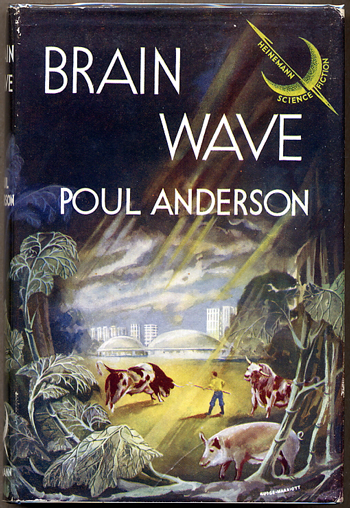

If everyone’s IQ was suddenly quintupled, how would our values and behaviors change? Poul Anderson’s slim novel, Brainwave, poses this question by sending the earth spinning into a new region of space that allows for uninhibited intellectual advancement. 1953. Included in A Treasury of Great Science Fiction vol II, ed by Anthony Boucher.
What I Liked: I picked up this anthology from a library booksale for $1 and I’m really glad I did. I enjoyed Brainwave. It follows several characters of varying mental capacity and shows the effects of their skyrocketing IQs on their individual spirits and souls. As it explores these individual impacts, it also imagines how the country—and other countries—as whole cultures are affected. One of the especially fun (and frightening) aspects of the novel is how the increased intelligence affects animals and their relations with humans. (Let me tell you, pigs are not happy about their destinies.) Some reviewers complained that they would have liked the story to be longer (so that it could more fully explore the worldbuilding), but I actually liked the length—short and sweet! It covers everything of interest to me, although I, like others, might have enjoyed seeing how the “brain wave” affected countries beyond our borders.
The ideas are all much more scientific than my review is making them sound, but I was far more interested in the psychological effects, so that’s what I’m focusing my review on.
What I Didn’t Like: One aspect dampened my enjoyment: The hero patronizes his lover, a brilliant female scientist named Helga, and she just accepts his disrespect. She’s just an afterthought, a tool to serve the main guy’s needs, and she doesn’t seem to mind. The hero is really pining after his sweet, beautiful, docile and stupid wife Sheila; but she, unlike his brilliant female scientist lover Helga, can’t handle the increased brain capacity. So he chooses Helga as next-best girl.
The author wasn’t saying, “Look at this poor pitiable woman. Even though she’s a brilliant female scientist, she doesn’t have the self-respect to demand better treatment from her potential lover.” No, the author seems to hold this up as ideal—look how sweet and patient she is with the tortured hero! That makes her a heroine, in spite of her general lack of Sheila’s beauty and naiveté.
No, thank you. I don’t align myself with the feminist movement, but this irritates me. (It irritates me equally when female authors treat male characters with similar disregard.) From what I hear, this is a common problem with early sci-fi—the women characters are, to put it nicely, cardboard.
However, the author does develop the first wife, Sheila, quite substantially and considerately and even gives her a complete character arc. His careful portrayal of the brain wave’s effects on Sheila’s delicate makeup—in conjunction with the intricately-imagined developments of animals and often-overlooked populations such as the mentally handicapped—by far make up for the indignity of the female scientist’s treatment. Helga was a minor character and her story didn’t often come up in the scheme of the book, so I didn’t have to fume over her all that often.
Overall: Other than the one complaint, I LOVED this story. I loved the idea, I loved the worldbuilding, and I loved the characters (mostly) and their individual adventures. I can see why the story was included in the treasury of great sci-fi. Great stuff.
Recommendation: I think anyone who wants an intro to sci-fi would enjoy this one. It has that certain bracing optimism that I love about speculative fiction. I think the character-development will generally please character-driven readers like me.

I have meant to tell you how much I like your reviews ! This book sounds like one I would let a kick out of 😉 Love and hugs, Kathy
Sent from my iPhone
>
LikeLiked by 1 person
Thanks for reading them, Kathy! I’m so glad you enjoyed it 😀
LikeLike
Interesting concept. Love the book cover for Brain Wave too.
LikeLiked by 1 person
I know, isn’ it great? Thanks for stopping by 🙂
LikeLike
Great review, Christy. It wouldn’t have occurred to me to review a classic like that. You might look at Edgar Rice Burroughs sometime; I’d like to see what you think of how he treats female characters.
LikeLiked by 1 person
Thanks Meagan!! 😀
Oh, I’ve read, er, INTERESTING things about Burroughs’s treatment of female characters in the John Carter books. But I haven’t read any of them, yet, so I’ll have to add that to my list. Thanks for stopping by!!
LikeLike